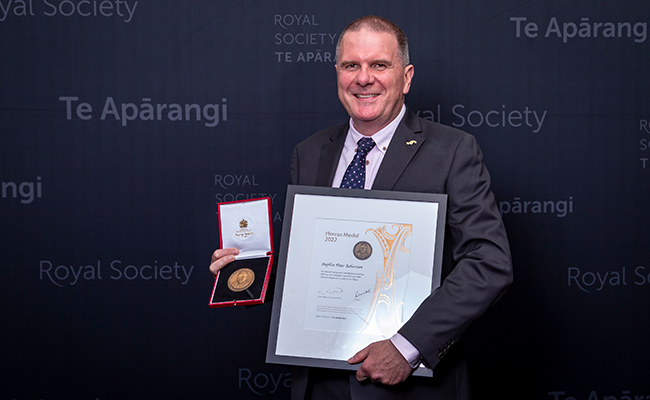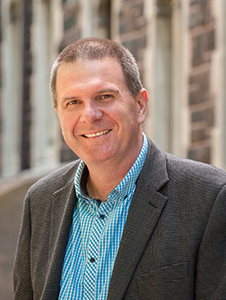
Professor Stephen Robertson is delighted to have been awarded the Hercus Medal.
It's been a month to remember for Professor Stephen Robertson, from the Dunedin School of Medicine's Department of Women's and Children's Health.
First, the Cure Kids Professor of Paediatric Genetics at Otago was awarded a $960,000 Marsden grant for research seeking to understand how disturbing a structural component of a developing brain cell can lead to intellectual disability.
Then this week, Professor Robertson received the Hercus Medal from the Royal Society Te Apārangi, for research on genetic conditions impacting children and seeking to establish equitable delivery of genomic medicine for Māori.
The prestigious Hercus Medal is awarded every two years for excellence in molecular and cellular sciences, biomedical or clinical science and public health.
Professor Robertson says, “I am absolutely delighted to be awarded this prestigious accolade. It signals recognition for my dedicated and hard-working team in the Laboratory for Genomic Medicine and for many colleagues who have been steadfast collaborators over the years.
“Hand-in-hand with their dedication has been the trust and enthusiasm of hundreds of whānau and thousands of research participants who have put their personal situation in our hands to understand and solve.
“I feel very privileged to be working in this way, both as a clinician and a researcher.”
Professor Robertson has gained international acclaim in his field for his expertise in genetic mutations, especially those affecting the skeleton and brain.
The work recognised by the Hercus Medal covers two decades of research to establish the cause of more than 50 genetic conditions that affect children predominantly. That includes about 30 projects which were led by his Laboratory for Genomic Medicine team.
Professor Robertson says much of this work, including the very first study, has centred on the healthcare needs of Māori and their communities.
More recently, he has been involved in large-scale, national projects such as the Aotearoa Variome Project and the Rakeiora Precision Medicine Project.

Professor Stephen Robertson
“Cure Kids first envisaged the creation of a Chair in Child Health Research over 20 years ago and this award is a clear signal that their investment has borne much fruit.
“I am very grateful for their support, as I am for my senior colleagues and mentors over the years and, of course, for the steadfast support of my family as well.”
In terms of the Marsden grant, Professor Robertson says it is a wonderful boost for his team and collaborators, who have already invested a lot of effort into understanding this newly defined genetic disorder.
“The Marsden Fund has supported our work hugely over the years with five previous project grants and we are most grateful for the support that this award brings.”
The Marsden funding will extend a five-year collaboration between the Laboratory for Genomic Medicine and Dr Luisa Weiss from Germany, a paediatrician and clinical geneticist.
The work has shown how a particular defective gene is critical in mediating the structure and function of nerve cells in the brain during foetal development.
Other key researchers involved in the project include Dr Laura Gumy from Anatomy, the DSM's specialist bioinformatician, Dr Greg Gimenez, and University of Helsinki neurobiologist Dr Takashi Namba.
The project uses specialist analysis of huge databases of genetic data from brain cells and models the disorder in cell cultures of developing neurons.
Professor Robertson says it's a privilege to work as a researcher and clinician at a research-focused institution like the University of Otago.
“Even as times get tough and resources become strained, it is essential that we don't lose sight of the fact that research informs not only the quality of the healthcare we deliver to our patients, but also the teaching we provide to our students.”
- Kōrero by Andrea Jones, Team Leader, Divisional Communications






